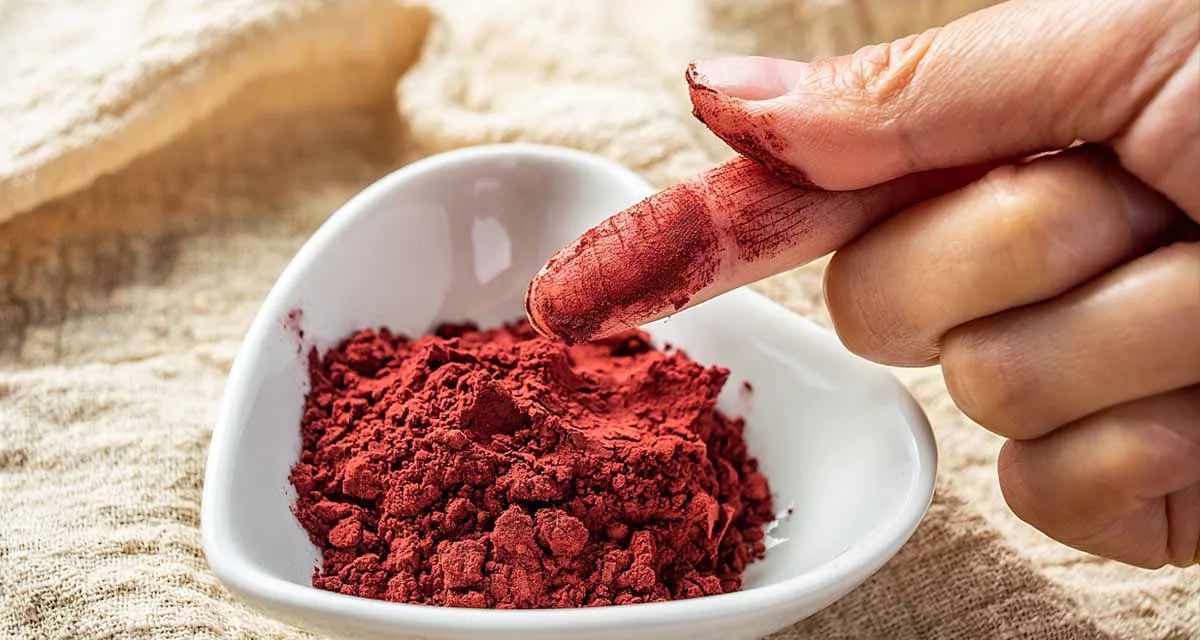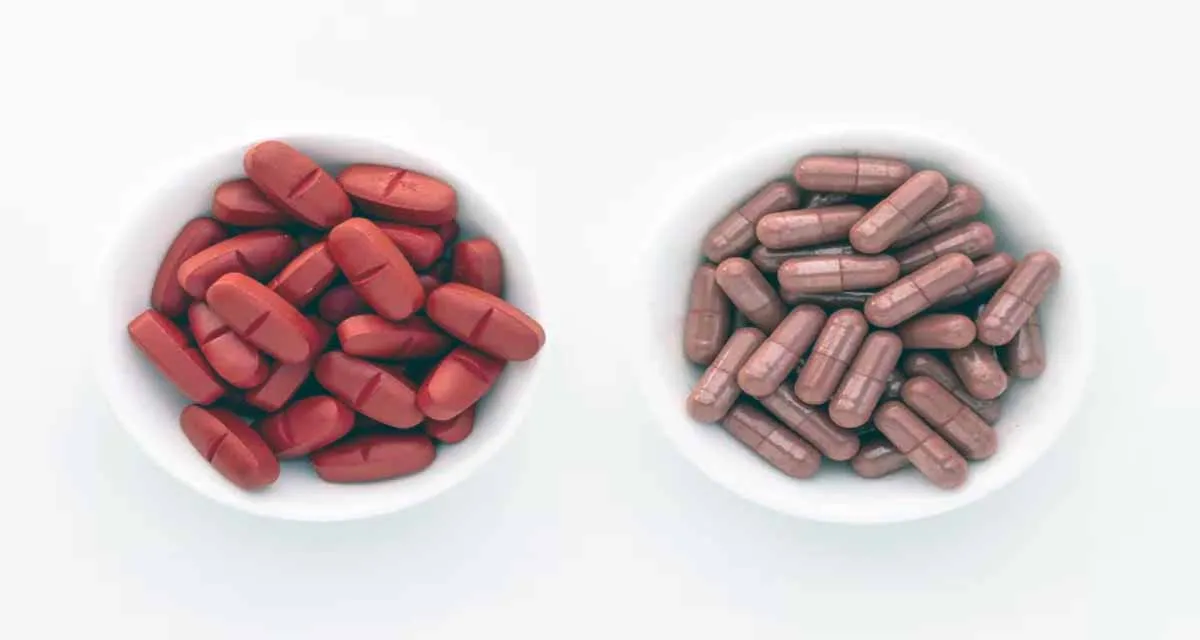Red yeast rice has been prized for its powerful medicinal properties for hundreds of years. However, in recent years it has gained followers thanks to the rise of natural medicine and supplementation with plant products.
As one of the best natural remedies for high cholesterol levels, the red yeast rice is one of the few natural supplements that contain active ingredients virtually identical to those found in prescription medications.
In addition, its benefits extend beyond the reduced cholesterol levels, with emerging research showing that it can also benefit inflammation, metabolic syndrome, blood sugar levels, and more.
Here are the benefits, side effects, and dosage recommendations for red yeast rice.
Table of Contents
What is red yeast rice
Red yeast rice is a type of fermented rice that is produced using specific species of mold, Monascus ruber or Monascus purpureus. It has been used in traditional Chinese medicine for centuries for its health-promoting properties.
This food contains the monacolin compound K, the same active ingredient found in prescription cholesterol-lowering drugs like lovastatin.
Scientific studies have also shown other beneficial effects, ranging from reducing the growth of cancer cells to improving insulin and blood sugar levels.
Today, red yeast rice is commonly sold as an over-the-counter supplement that is marketed to help control cholesterol and improve overall health.

Main potential benefits of red yeast rice
Possible benefits of red yeast rice include:
- Improving heart health
- Activity on metabolic syndrome
- Decreased inflammation
May promote heart health
Heart disease is a serious condition that affects millions and is estimated to account for 31.5% of deaths worldwide. High cholesterol is one of the main risk factors for heart disease, as it can cause arteries to narrow and harden, increasing the risk of heart attack and stroke.
Red yeast rice is commonly used as a natural remedy to help reduce cholesterol levels and promote heart health, and can sometimes have fewer adverse side effects than prescription medications used to treat high cholesterol.
A review of 21 studies found that it was effective in reducing total and LDL (bad) cholesterol levels, as well as triglycerides and blood pressure, when combined with statins (scientific information).
In addition, the monacolin K it can also help improve endothelial function or the flexibility and adaptability of your blood vessels, which is key to maintaining vascular and cardiac health.
Red Yeast Rice May Reduce Inflammation
Inflammation is a normal immune response designed to protect your body against acute infections and foreign invaders. However, continued inflammation is thought to contribute to chronic diseases such as diabetes, cancer, and heart disease.
Scientific studies show that supplementation with red yeast rice may help reduce inflammation and promote better long-term health. For example, a study in 50 people with metabolic syndrome showed that taking a supplement containing it and olive extract for 8 weeks reduced levels of oxidative stress, a key cause of chronic inflammation, by up to 20%.
Similarly, one study found that administering red yeast extract in rats with kidney damage reduced levels of specific proteins involved in inflammation in the body.
However, more comprehensive studies with larger sample sizes are needed to reach more serious conclusions.
May have anti-cancer properties
Although current research is limited to animal and specimen studies, some evidence suggests that yeast rice may help reduce the growth and spread of cancer cells.
One study found that giving mice with prostate cancer Red yeast rice powder significantly decreased tumor volume compared to a control group (source of information).
However more research needed to evaluate the effects of red yeast rice on other cancers in humans. Specifically, more studies need to be done to determine how its potential anticancer effects may affect the general population.
May help treat metabolic syndrome
Metabolic syndrome is a group of conditions that increase your risk of chronic conditions, such as heart disease, diabetes, and stroke.
Some of the criteria for metabolic syndrome include high blood pressure, excess body fat, increased blood sugar, and alterations in cholesterol or triglyceride levels.
Several studies have found that red yeast rice can help treat some of these risk factors and could be used as a natural treatment to aid in its prevention (see studies).
One of its best-documented effects is its ability to lower cholesterol. Research shows that it can effectively reduce total and LDL (bad) cholesterol levels.

Contraindications of red yeast rice
Side effects
Despite the list of benefits associated with red yeast rice, supplement it may have some side effects, so it is best to speak with a medical specialist before taking this supplement.
Gastrointestinal problems such as bloating, gas, and stomach pain are some of the most common side effects of red yeast rice.
In more extreme cases, it can also cause problems such as muscle problems, liver toxicity, and allergic reactions, similar to the side effects caused by prescription cholesterol-lowering drugs.
Because research is still limited on the long-term safety of red yeast rice, it is also not recommended for pregnant or breastfeeding women. If you notice any adverse symptoms after taking red yeast rice, consider decreasing your dosage or discontinuing its use, and consult a trusted healthcare professional.
Citrinin formation
Finally, red yeast rice that is not grown carefully may contain a byproduct called citrinin. Citrinin is a mycotoxin or a toxin produced by certain types of mold.
Researchers have observed that it can cause kidney failure in animals and can affect gene expression in humans.
Legal status
Monacolin K is the active compound found in red yeast rice that is commonly extracted and used in statins and cholesterol-lowering medications. According to the U.S. Food and Drug Administration (FDA), yeast rice products containing monacolin K should be considered a medicinal product, subjecting them to stricter regulations than standard over-the-counter supplements.
Red yeast rice supplements are still legal, but they should only contain traces of monacolin K. As a consumer, it is impossible for you to know how much monacolin K a supplement may contain, because only the amount of yeast rice is indicated on the label.
Medication interactions
Red yeast rice contains monacolin K, the key active component used to make statins, which are used to lower cholesterol. For this reason, you should not take yeast rice if you are already taking a statin, unless directed to do so by a healthcare professional.
Red yeast rice may also interact with the same medications that statins interact with, including other cholesterol-lowering medications, antibiotics, certain antidepressants, antifungals, and antiretrovirals.
If you are taking any medicameIt’s a good idea to talk to a trusted healthcare professional before you start taking red yeast rice supplements.
